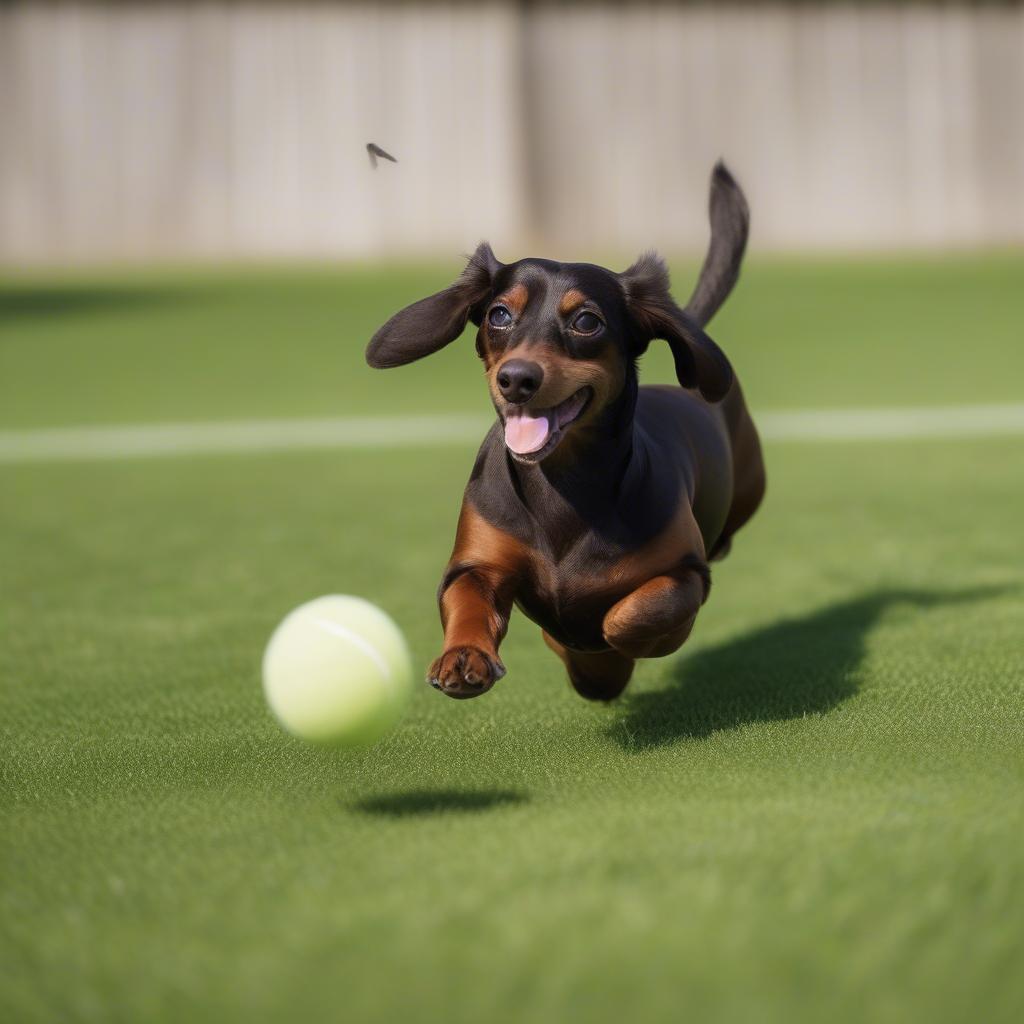The Brown Doxie, a variation of the miniature dachshund, is a beloved breed known for its charming personality and unique appearance. This guide will delve into the world of the brown doxie, covering everything from their temperament and care to their history and popularity. We’ll explore what makes these little dogs so special and why they’ve captured the hearts of so many.
Understanding the Brown Doxie Temperament
Brown doxies, like all dachshunds, are known for their spirited and playful nature. They are intelligent, curious, and often a bit mischievous. Bred originally to hunt badgers, they retain a strong prey drive and can be quite tenacious. This also means they can be stubborn at times, so consistent training is key. Their playful nature makes them great companions for both individuals and families, but they can also be protective and make good watchdogs, alerting you to anything unusual with a sharp bark.
 Brown Doxie Playing Fetch
Brown Doxie Playing Fetch
Caring for Your Brown Doxie
Caring for a brown doxie involves attention to their specific needs. Their long backs make them prone to intervertebral disc disease (IVDD), so it’s crucial to avoid activities that put strain on their spine, such as jumping from heights. Maintaining a healthy weight is also essential to minimize the risk of back problems. Regular grooming is important, particularly for smooth-coated brown doxies, and their ears should be checked and cleaned regularly to prevent infections.
Feeding Your Brown Doxie
A balanced diet is vital for a healthy brown doxie. Choose a high-quality dog food formulated for small breeds and avoid overfeeding. Be mindful of treats and table scraps, as these can contribute to weight gain.
 Brown Doxie Enjoying Mealtime
Brown Doxie Enjoying Mealtime
Exercise and Training
Brown doxies need regular exercise to stay healthy and happy, but it should be moderate and controlled. Short walks and playtime in a secure area are ideal. Early socialization and consistent training are crucial for developing a well-behaved and well-adjusted brown doxie.
History and Origins of the Brown Doxie
The dachshund breed originated in Germany, bred to hunt badgers and other burrowing animals. Their long bodies and short legs were perfectly suited for navigating underground tunnels. The brown coloring is one of the standard dachshund coat colors, arising from specific genetic combinations. While the exact history of the brown doxie is intertwined with the broader history of the dachshund breed, their specific coloring has always been a popular choice.
The Brown Doxie in Modern Times
Today, brown doxies are popular companion animals appreciated for their affectionate and playful personalities. Their compact size makes them well-suited for apartment living, and their adaptability makes them great companions for various lifestyles.
 Brown Doxie Showing Affection
Brown Doxie Showing Affection
Conclusion
The brown doxie is a charming and lovable breed that makes a wonderful companion. By understanding their specific needs and providing proper care, training, and attention, you can ensure your brown doxie lives a long, healthy, and happy life. Owning a brown doxie is a rewarding experience, filled with playful antics, loyal companionship, and endless affection. Remember to prioritize their health, particularly their back, and provide them with the love and attention they deserve.
FAQ
- Are brown doxies good with children?
- How much exercise does a brown doxie need?
- What health problems are common in brown doxies?
- What is the average lifespan of a brown doxie?
- Are brown doxies easy to train?
- What is the best food for a brown doxie?
- How often should I groom my brown doxie?
Common Brown Doxie Questions
- Why do brown doxies dig so much? This behavior stems from their hunting instincts.
- How can I prevent my brown doxie from barking excessively? Proper training and socialization can help curb excessive barking.
- Are brown doxies prone to separation anxiety? Yes, they can be, so it’s important to establish a routine and provide them with plenty of mental stimulation.
Further Reading
For more information on dachshund care and training, visit our other articles on [link to other relevant articles].
When you need assistance, please contact us at My Dinh, Hanoi, Vietnam or San Francisco, CA 94105, USA. We have a 24/7 customer support team.


